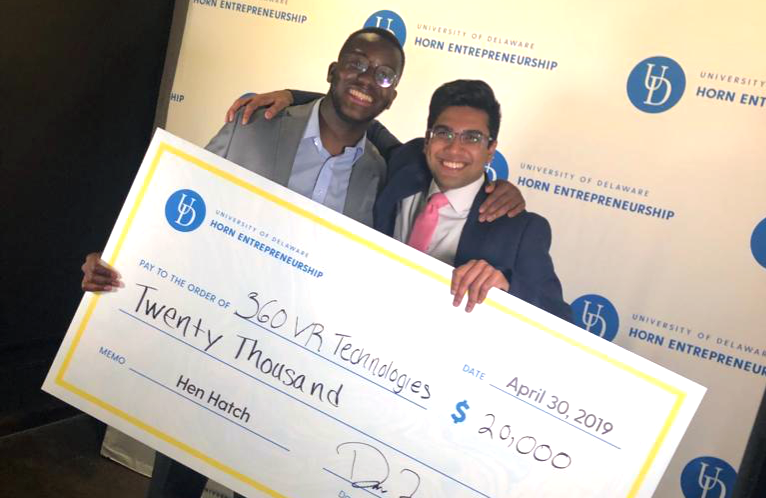Entrepreneurial University of Delaware undergrads James Massaquoi and Sury Gupta have no lack of ambition: Their tech firm Intellecta includes several developing ventures, including a online rental platform called Rentula and a high-tech food truck called VeganHealthy.
But it’s their virtual reality venture, recent Hen Hatch winner 360VR Technology, that has the most potential impact.
When Technical.ly covered 360VR Technology in the past (including a VR tour of Carvertise’s then-new Riverfront location), it’s been framed as a company that was designed to do cool virtual tours for business marketing and real estate agents.
In reality, they were quietly researching a model that would go far beyond real estate.
“A [Horn Entrepreneurship] professor said, ‘That’s great, but’s not really solving a significant problem,” said Gupta. It was more of a ‘nice to have’ than a ‘need to have.'”
Which is how VR is usually perceived — fun, but it’s not out there saving lives.
If Gupta and Massaquoi have their way, VR, along with drone technology, will innovate first-responder technologies and make it easier for them to help people in disaster situations, from a fire to a terrorist attack.
The pivot from real estate listing to emergency services started when the team landed on risk management as an area with problems they could focus on solving — and realized that managing risk is a huge part of the job for emergency services and first responders.
“We talked to a friend of a friend who’s a volunteer firefighter in Newark and we learned how they handle all of the properties in their jurisdiction,” said Gupta. “We learned that a lot of the time, the information that would be really helpful to them, like floor plans, aren’t available, so they have to do a quick size-up where they look at the outside of the building and try to figure out what’s on the inside before going in to save the people and stop the fire. It’s a really big risk, having to go into a burning building and not knowing any of the layout.”
After identifying a lack of floor plans as a problem with life-or-death consequences, the team made a quick 3D model of a house and took it to a local fire department for feedback.
“They have a binder full of floor plans that are very basic and haven’t been updated in years, but it’s like their best friend,” said Gupta.
They were impressed by the possibilities of 3D models: “It’s digital, and it’s accessible on you mobile phone or website or tablet, so they’d have it whenever they need it as many times as they need it,” he said.
The technology is initially intended for buildings with a large number of people inside on a regular basis — schools, office buildings, sports and concert venues — where a highly detailed 3D floor plan would be most valuable in a disaster situation.
Not surprisingly, schools have shown interest. There are talks with the Department of Education, Delaware State Fire School, Delaware Homeland Security and UDPD.
“One of our upcoming projects is the Bob Carpenter Center,” Gupta said.
One thing that sets 360VR Technology’s security platform is the software they’re building around the models.
“There’s not really anyone doing that,” said Massaquoi.
Hen Hatch, with it’s $20,000 top prize, is just one of the pitch competitions Gupta and Massaquoi have participated in to help fund 360VR. The duo has traveled the country making their pitch at events, including Student Startup Madness Startup of the Year at SXSW in Austin; TCU Values and Ventures Competition in Fort Worth, Texas; Startup World Cup in Boston; and UC Davis Big Bang Competition Finals in Davis, California.
“We had some practice before Hen Hatch,” said Gupta.
Eventually, Gupta and Massaquoi have plans to integrate their software with tech like security cameras and automatic locking doors. For now, they’re bootstrapping it and competing when they can as they get ready to participate in Horn’s Summer Founders program this summer before seeking out investors.







